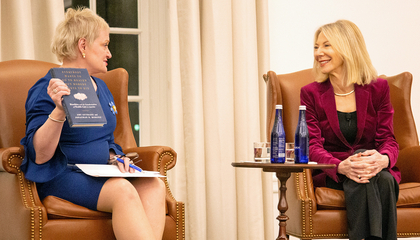On Tuesday, November 19, The Greenwall Foundation, the NYU Center for Bioethics, and the NYU College of Global Public Health had the privilege of hosting the 2019 William C. Stubing Memorial Lecture entitled “Can Democratic Deliberation Help Us To Resolve Difficult Issues? The Case of Physician Aid-In-Dying.”
The event was kicked off with a reception and followed by a conversation with Dr. Amy Gutmann, President and Christopher H. Browne Distinguished Professor of Political Science and Professor of Communication at the University of Pennsylvania, as well as Chair of the Presidential Commission for the Study of Bioethical Issues (2009-2017). The conversation was moderated by Susan Dentzer, Senior Policy Fellow at the Duke-Margolis Center for Health Policy, former Editor-in-Chief of Health Affairs, and former on-air correspondent for PBS NewsHour.
“This is human life and to die with dignity requires a certain set of very important steps to take...Death with dignity laws underscore that everybody has the last act in life. And if you know with reasonable certainty that you're soon going to die, and you know that you're going to suffer damages to your very identity, taking the last act in your hands with the aid of a physician who gives you a safe drug is a perfectly reasonable way to have your last act.”
Dr. Gutmann defined democratic deliberation as “reasoned discussion that comes to some conclusion that is mutually justifiable.” She noted that this is a favorable method for decision-making because it allows us to give reasons to one another and show respect for other people's points of view. As the overall theme of the lecture, democratic deliberation was discussed mostly in terms of physician aid-in-dying, but also with the cases of the anti-vaccination movement and universal health coverage.
Physician aid-in-dying, also known as physician-assisted death and death with dignity, is “an end-of-life option that allows certain eligible individuals to legally request and obtain medications from their physician to end their life in a peaceful, humane, and dignified manner.” But this option does not come without ethical controversy.
Dr. Gutmann discussed the current state of physician aid-in-dying in the United States, and offered a case study of Brittany Maynard, a woman who transformed the conversation surrounding physician-assisted death as a result of her own medical situation and subsequent death in 2014.
Following the conversation, audience members had the opportunity to participate in a Q&A session. Topics from the audience included: education’s role in combating social media “bubbles,” democratic deliberation in an era of big data and artificial intelligence, the importance of ethical and scientific literacy, poverty and physician-assisted death in terms of accessibility, and religion and physician-assisted death.
